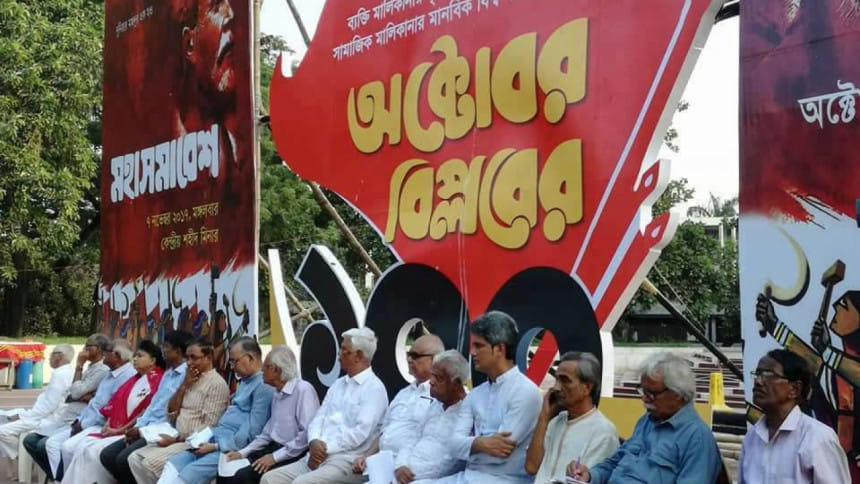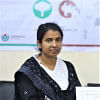Are women not revolutionaries?

Translated by Abdullah Nadvi
Around a week ago, on November 7, I was at the Shaheed Minar, among thousands who joined a rally—the final event marking the centennial celebrations of the Soviet Revolution. I looked for portraits of Alexandra Kollontai, Elena Stasova, Nadezhda Krupskaya and other brave women who took part in the October Revolution in Russia a century ago. I looked for portraits of Rosa Luxemburg, Clara Zetkin, Begum Rokeya, Ila Mitra, Simone de Beauvoir—women who have led campaigns to bring about revolutionary changes in society and in the mindsets of people in their own countries as well as in the international sphere. Was it too much to expect the presence of the great women of history there?
The processions were ablaze with a revolutionary zeal that day, teeming with red flags and festoons, the air frenetic with passionate slogans. In this city of millions, we are used to suffering from extreme alienation, but on November 7, we did not feel alone; rather, the rally imbued in us a sense of camaraderie, courage and determination. We felt a renewed vigour inside us—to ignore the risks, to challenge the status quo, to change the world. Even if it cost us our lives.
People from the working class constituted the majority. On two sides of the arena were two giant portraits of the Soviet leader Vladimir Lenin. His portraits loomed over us from the far corners of the Shaheed Minar as well. On one side, there were portraits of Mao, Stalin, Engels and Marx. Professor Serajul Islam Choudhury and Dr Ahmed Rafique sat on stage, along with leaders of different progressive leftist parties—Comrade Mujahidul Islam Selim, Khalequzzaman Bhuiyan, Mobinul Haider Chowdhury, Saiful Haque, Zonayed Saki, Tipu Biswas, Mosharraf Hossain Nannu, Hamidul Haque, Shamsuzzaman Milon and Shawkat Hossain, among others. Ostensibly, there was only one woman sitting on that stage—Moshrefa Mishu.

Men and women (their presence was significant), in waves, were joining the assembly. Some came with anti-imperialist festoons; some were holding their party flags. All over, people were holding placards with different demands, slogans and portraits of the great revolutionary leaders of the past. But no one had portraits of the women who contributed to the Soviet Revolution and to the revolutionary transformation of the world.
When the post-assembly rally was marching to Paltan from Shaheed Minar, I observed that many leftist parties had erected decorated gates in front of their offices to celebrate the centennial. Here also, only male leaders were represented.
It seemed strange. I had so many questions in my mind. Who is the authority of a revolution? What qualities must someone possess and what contributions must that person make to be considered a leader? What qualifies as a contribution, anyway? How many meetings must a person preside over, and how many theories must they churn, to be remembered as a leader? I am not speaking solely about the October Revolution; so many women have fought in the struggle for revolutionary changes—as leaders, organisers and academics. Have we really acknowledged them enough?
Let us leave out the bourgeois parties for the moment and focus on the leftist progressive parties of Bangladesh. Even today, the presence of women in key leadership positions in these parties is insignificant. The number of women contributing as organisers and as academics is also insufficient. Perhaps that is why women themselves forget to pay homage to those who have influenced revolutions and revolutionary thinking. We fail to ask the difficult questions about representation and exclusionary politics, and thus, we forget the flagbearers of women's emancipation even as we celebrate and envision an equal and just world.

As long as the number of women in central committees of parties does not increase (and I am not talking about increasing this number through quotas), as long as the front-row seats at assemblies remain occupied mostly by men, as long as women do not theorise revolutions, it is only natural that we will keep forgetting to remember our history. Till we see more women become authoritative figures in politics, history, science, literature, economics, this will go on. And we cannot change the status quo if we wait for the men leading the political parties to give us the "opportunity" to lead. We have to create and sustain women's leadership through our own qualities and capacities.
The struggle of a woman is to establish herself as an authority in her family, community, party, nation and so on. At times, a woman's struggle is much more difficult than that of a man. Every day, women sacrifice themselves so that the men in their lives and communities may become better leaders, historians and writers. Often, women make these sacrifices unconsciously, unknowingly, but they are not acknowledged by state and society. Their work does not get acknowledged either. There is no pride in such sacrifices.
It is true that the task of remembering revolutionary women at the rallies of the October Revolution Centennial falls primarily on the women. But the responsibility is not theirs alone. The struggle for equality lies with both men and women. The struggle must go on—within ourselves, within our communities within our progressive parties; we cannot hope to change society, to be radicals, while ignoring one half of the population. We call upon those men and women who dream of rupturing the structures of power, to take up this challenge.
Taslima Akhter is President, Bangladesh Garment Sromik Samhati, and a photographer.
Abdullah Nadvi is General Secretary, Ecology Movement.

 For all latest news, follow The Daily Star's Google News channel.
For all latest news, follow The Daily Star's Google News channel. 



Comments